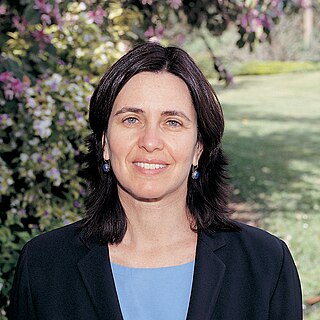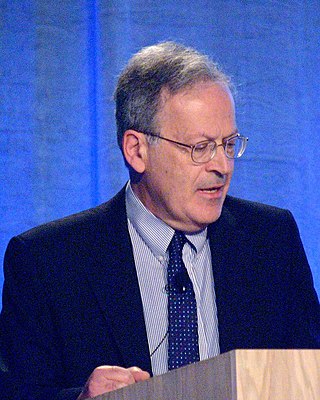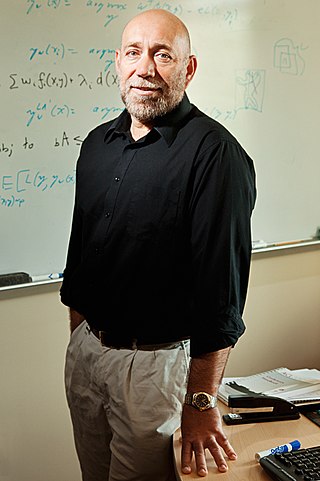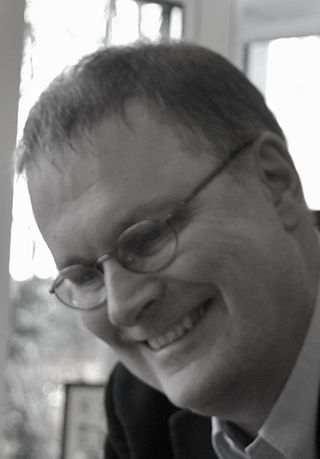
Stephen Arthur Cook is an American-Canadian computer scientist and mathematician who has made significant contributions to the fields of complexity theory and proof complexity. He is a university professor emeritus at the University of Toronto, Department of Computer Science and Department of Mathematics.
Combinatorial game theory measures game complexity in several ways:
- State-space complexity,
- Game tree size,
- Decision complexity,
- Game-tree complexity,
- Computational complexity.

Shafrira Goldwasser is an Israeli-American computer scientist and winner of the Turing Award in 2012. She is the RSA Professor of Electrical Engineering and Computer Science at Massachusetts Institute of Technology; a professor of mathematical sciences at the Weizmann Institute of Science, Israel; the director of the Simons Institute for the Theory of Computing at the University of California, Berkeley; and co-founder and chief scientist of Duality Technologies.
In the mathematical discipline of graph theory, a feedback vertex set (FVS) of a graph is a set of vertices whose removal leaves a graph without cycles. Equivalently, each FVS contains at least one vertex of any cycle in the graph. The feedback vertex set number of a graph is the size of a smallest feedback vertex set. The minimum feedback vertex set problem is an NP-complete problem; it was among the first problems shown to be NP-complete. It has wide applications in operating systems, database systems, and VLSI chip design.

Lenore Carol Blum is an American computer scientist and mathematician who has made contributions to the theories of real number computation, cryptography, and pseudorandom number generation. She was a distinguished career professor of computer science at Carnegie Mellon University until 2019 and is currently a professor in residence at the University of California, Berkeley. She is also known for her efforts to increase diversity in mathematics and computer science.
Allan Bertram Borodin is a Canadian-American computer scientist who is a professor at the University of Toronto.

Leslie Gabriel Valiant is a British American computer scientist and computational theorist. He was born to a chemical engineer father and a translator mother. He is currently the T. Jefferson Coolidge Professor of Computer Science and Applied Mathematics at Harvard University. Valiant was awarded the Turing Award in 2010, having been described by the A.C.M. as a heroic figure in theoretical computer science and a role model for his courage and creativity in addressing some of the deepest unsolved problems in science; in particular for his "striking combination of depth and breadth".

Marcus Hutter is a professor and artificial intelligence researcher. A Senior Scientist at DeepMind, he is researching the mathematical foundations of artificial general intelligence. He is on leave from his professorship at the ANU College of Engineering and Computer Science of the Australian National University in Canberra, Australia. Hutter studied physics and computer science at the Technical University of Munich. In 2000 he joined Jürgen Schmidhuber's group at the Istituto Dalle Molle di Studi sull'Intelligenza Artificiale in Manno, Switzerland. He developed a mathematical theory of artificial general intelligence. His book Universal Artificial Intelligence: Sequential Decisions Based on Algorithmic Probability was published by Springer in 2005.
In computational complexity, problems that are in the complexity class NP but are neither in the class P nor NP-complete are called NP-intermediate, and the class of such problems is called NPI. Ladner's theorem, shown in 1975 by Richard E. Ladner, is a result asserting that, if P ≠ NP, then NPI is not empty; that is, NP contains problems that are neither in P nor NP-complete. Since it is also true that if NPI problems exist, then P ≠ NP, it follows that P = NP if and only if NPI is empty.
The ethics of artificial intelligence is the branch of the ethics of technology specific to artificially intelligent systems. It is sometimes divided into a concern with the moral behavior of humans as they design, make, use and treat artificially intelligent systems, and a concern with the behavior of machines, in machine ethics.

Martin Charles Golumbic is a mathematician and computer scientist known for his research on perfect graphs, graph sandwich problems, compiler optimization, and spatial-temporal reasoning. He is a professor emeritus of computer science at the University of Haifa, and was the founder of the journal Annals of Mathematics and Artificial Intelligence.

Georg Gottlob FRS is an Austrian-Italian computer scientist who works in the areas of database theory, logic, and artificial intelligence and is Professor of Informatics at the University of Calabria. He was Professor at the University of Oxford.
Philip E. Agre is an American AI researcher and humanities professor, formerly a faculty member at the University of California, Los Angeles. He is known for his critiques of technology. He was successively the publisher of The Network Observer (TNO) and The Red Rock Eater News Service (RRE). TNO ran from January 1994 to July 1996. RRE, an influential mailing list he started in the mid-1990s, ran for around a decade. A mix of news, Internet policy and politics, RRE served as a model for many of today's political blogs and online newsletters.

Shlomo Zilberstein is an Israeli-American computer scientist. He is a Professor of Computer Science and Associate Dean for Research and Engagement in the College of Information and Computer Sciences at the University of Massachusetts, Amherst. He graduated with a B.A. in Computer Science summa cum laude from Technion – Israel Institute of Technology in 1982, and received a Ph.D. in Computer Science from University of California at Berkeley in 1993, advised by Stuart J. Russell. He is known for his contributions to artificial intelligence, anytime algorithms, multi-agent systems, and automated planning and scheduling algorithms, notably within the context of Markov decision processes (MDPs), Partially Observable MDPs (POMDPs), and Decentralized POMDPs (Dec-POMDPs).

Dan Roth is the Eduardo D. Glandt Distinguished Professor of Computer and Information Science at the University of Pennsylvania.
This glossary of artificial intelligence is a list of definitions of terms and concepts relevant to the study of artificial intelligence, its sub-disciplines, and related fields. Related glossaries include Glossary of computer science, Glossary of robotics, and Glossary of machine vision.
Computational social choice is a field at the intersection of social choice theory, theoretical computer science, and the analysis of multi-agent systems. It consists of the analysis of problems arising from the aggregation of preferences of a group of agents from a computational perspective. In particular, computational social choice is concerned with the efficient computation of outcomes of voting rules, with the computational complexity of various forms of manipulation, and issues arising from the problem of representing and eliciting preferences in combinatorial settings.

Thomas G. Dietterich is emeritus professor of computer science at Oregon State University. He is one of the pioneers of the field of machine learning. He served as executive editor of Machine Learning (journal) (1992–98) and helped co-found the Journal of Machine Learning Research. In response to the media's attention on the dangers of artificial intelligence, Dietterich has been quoted for an academic perspective to a broad range of media outlets including National Public Radio, Business Insider, Microsoft Research, CNET, and The Wall Street Journal.

Michael John Wooldridge is a professor of computer science at the University of Oxford. His main research interests is in multi-agent systems, and in particular, in the computational theory aspects of rational action in systems composed of multiple self-interested agents. His work is characterised by the use of techniques from computational logic, game theory, and social choice theory.
Michael Genesereth is an American logician and computer scientist, who is most known for his work on computational logic and applications of that work in enterprise management, computational law, and general game playing. Genesereth is professor in the Computer Science Department at Stanford University and a professor by courtesy in the Stanford Law School. His 1987 textbook on Logical Foundations of Artificial Intelligence remains one of the key references on symbolic artificial intelligence. He is the author of the influential Game Description Language (GDL) and Knowledge Interchange Format (KIF), the latter of which led to the ISO Common Logic standard.











